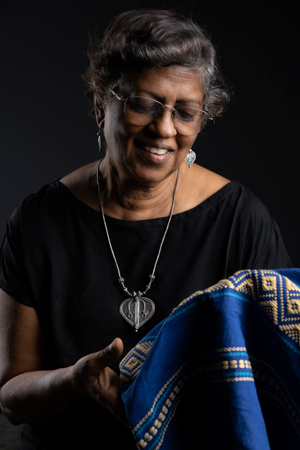A voice for saving tradition

Ninel Fernando: Contemporary touch
Traditional crafts don’t just make great souvenirs—they are mini periscopes into a region’s culture and geography. Veteran Designer and Lecturer at the University of Moratuwa, Ninel Fernando has dedicated her life to studying the history of these crafts. Decades of knowledge and practice is the foundation on which she has built her company, Ninela where her designs often take inspiration from the experts who’ve come before her.
Growing up in the bustling city of Kandy, home to traditions and sights steeped in rich history and culture, Ninel eagerly observed the spectacles on display and couldn’t help but feel a special connection to them. Intricate crafts were all around her and she has memories of visiting the local shops with her mother and admiring the glittering handmade gold jewellery, grand designs which were once only reserved for aristocracy and royalty during the feudal era.
She went on to apply for a design course in India where she spent the next four years before returning to work in Sri Lanka in 1974, gaining experience by working in the Department of Small Industries as a designer for over 70 handloom centres before moving on to the National Design Centre where she was responsible for training local artisans in their home villages. Since then she has been providing them with design inputs to help increase their income and to cater to modern market needs.
Having travelled extensively and visited museums which house the earliest historical crafts of the island, Ninel would study and photograph these forgotten pieces and share them with the rural artisans to reintroduce lost motifs and designs to broaden their collections. Symbols of wealth, prosperity, grandeur, strength, virtue and more, these original creations with roots in the Sinhalese, Tamil and Muslim communities have given way for fresh crafts such as necklaces inspired by traditional beads worn by Kandyan brides and jewellery inspired by the embellished waist chains worn by women of the Tamil community.
 The skills and knowledge required to make Sri Lanka’s traditional crafts vary widely. The vibrant rural textiles are expertly woven by artisans who’ve mastered centuries old techniques to bring spectacular designs to life. Careful and precise hands are responsible for creating shimmering jewellery fitted with precious stones. And it takes unrelenting dedication to grow, harvest, process and meticulously weave the plethora of sustainable rush and reed products made for an equal number of uses.
The skills and knowledge required to make Sri Lanka’s traditional crafts vary widely. The vibrant rural textiles are expertly woven by artisans who’ve mastered centuries old techniques to bring spectacular designs to life. Careful and precise hands are responsible for creating shimmering jewellery fitted with precious stones. And it takes unrelenting dedication to grow, harvest, process and meticulously weave the plethora of sustainable rush and reed products made for an equal number of uses.
Working with several crafting families around Kandy, Ninel explained that the techniques and practices were passed down from father to son and from mother to daughter ensuring each generation dipped their toes into the creative waters of crafting.
In recent years, she explains that traditional craft making has been diminishing due to falling demand and fewer crafts people who possess these specialized skills, however, the pandemic has undoubtedly been the biggest cause for this new unsettling landscape for endangered crafts. “It is important to preserve them because it is tradition not for the sake of tradition, but it is what we are used to; it’s part of our culture and lifestyle and that should not be forgotten,” she says.
She’s worked closely with generations of families from areas such as Ududumbara, Matale, Gampola, Peradeniya and more. As the finished products are polished and pristine, anyone admiring them would expect them to have been assembled in a factory environment however, artisans skilfully transform raw materials in contrastingly simple conditions and only with the use of traditional tools to make their creations. Art and daily life mesh easily as they work from home to the sound of verses or ‘kavi’ which they often recite harmoniously as part of tradition. Despite having the option to make use of modern technology and tools, they choose not to deviate from the practices they’ve known all their lives and continue to make and deliver the high quality products with the tools they are accustomed to.
In recent days, their livelihoods have suffered the blow of the pandemic with the price of essential materials like gold and silver rising sharply and orders dwindling.
The timing could not have been worse for this struggling area of expertise. Reduced spending, the pandemic and subsequent lockdown have had a devastating impact on craft makers. At this rate, Ninel shares that no one can be certain for how long this profession can be sustained. Efforts to support them are needed to ensure they remain once the storm passes.



